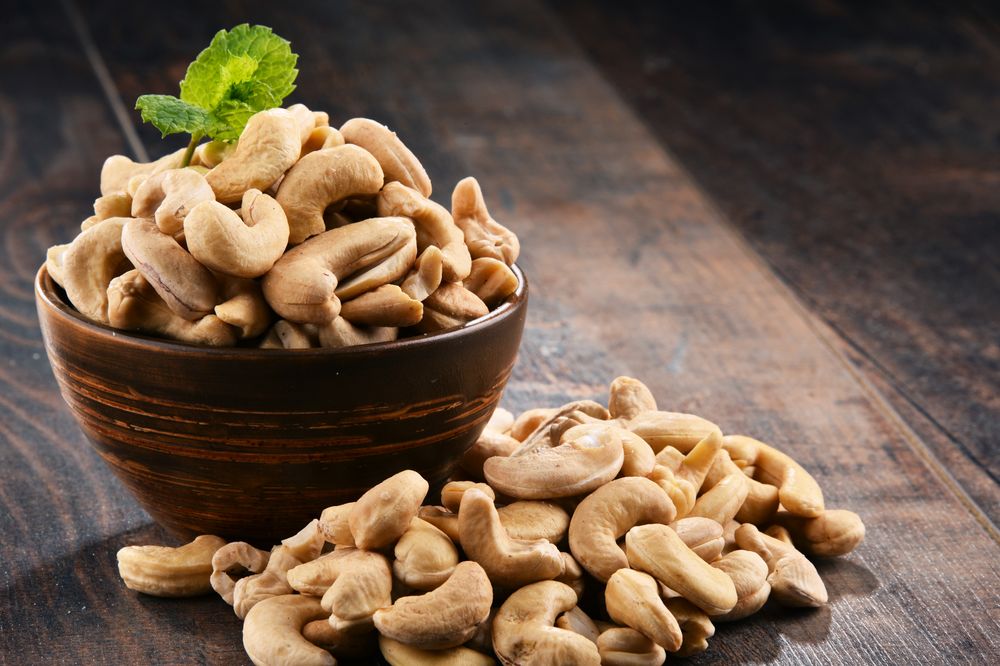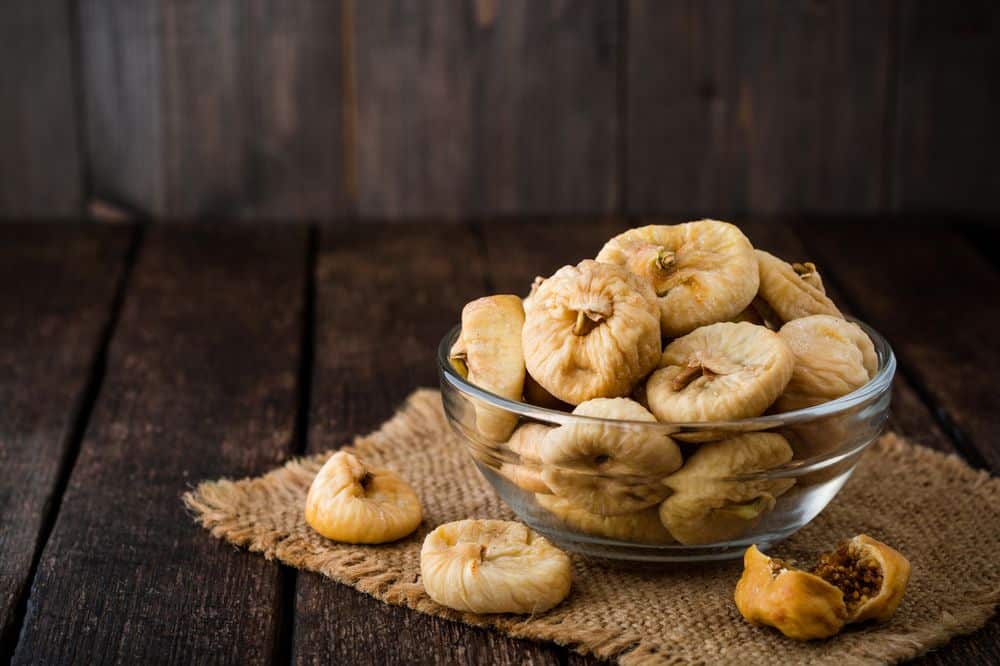1. Almond
Almonds are the seeds of the prune trees. They are low-carb nuts that you can find in salted, unsalted, raw or roasted form. Raw almonds are sodium-free and are better for people with high blood pressure. However, almonds are calorie-rich foods and can be harmful to people with type 2 diabetes. Therefore, you should eat them in moderation.
Almonds are also beneficial for a sharp memory. Also, the antioxidants and omega-3 present in almonds help delay the cell ageing process in the brain cells.
The best way to include almonds in your diet can be an oatmeal topping, almond milkshake, or just consuming them raw for breakfast.
Nutrition Value of Almond
100 grams of unsalted almonds contain:
- Calories: 620.17 KCal
- Fat: 49.93 g
- Carbohydrates: 21.55 g
- Fibre: 12.5 g
- Protein: 21.15 g
2. Pistachios
Pistachios grow on trees and belong to the cashew family. The nuts may be yellow or green, and the hard shell enclosure covering the pistachio helps protect the nut/seed.
Pistachios are rich in micro and macronutrients, such as potassium, magnesium and vitamin B6. Vitamin B6 is an essential nutrient for the body as it helps to make haemoglobin in the blood. Haemoglobin is required to transport oxygen to various cells inside the body. Moreover, pistachios are also rich in vitamin A, a type of carotenoid. Carotenoids are essential to improve eyesight.
The best way to consume pistachios is to eat them raw as a delicious snack. They are also very popularly used in flavoured milk and milkshakes.
Nutrition Value of Pistachios
100 grams of pistachios contain:
- Calories: 626 kCal
- Carbohydrates: 16.2 g
- Protein: 19.8 g
- Fibre: 10.3 g
- Fats: 53.5 g
3. Dates
Dates are the fruits of the palm tree and have a single seed. However, you can find the seedless variant of dates in the market. They are a prevalent dry fruit, and people commonly eat them during winters. In addition, they are naturally dehydrated and low in moisture content. Although dates are high in calories and sugar, they have several health benefits.
Dried dates are rich in dietary fibre, which helps keep you satiated and suppress your cravings. It is rich in iron which helps prevent issues like anaemia. Dates may help reduce weight, increase haemoglobin, improve gut health and provide energy.
Dates are naturally rich in antioxidants and polyphenols. The antioxidants help reverse and prevent oxidative damage caused by free radicals inside the body.
Dates make excellent snacking options because they are pretty filling. One way to include dates in your diet can be by having them for breakfast with milk. It makes a very nutritious meal.
Nutrition Value of Dates
100 grams of Dates contains:
- Calories: 317 kCal
- Carbohydrates: 75.8 g
- Protein: 2.5 g
- Fibre: 8.3 g
- Fats: 0.4 g
4. Cashew

Cashew nuts are the seeds of the cashew tree. They are rich in minerals, fibre, and plant protein. Cashew also contain high amounts of healthy monounsaturated fats. They are also rich in antioxidants and polyphenols. Polyphenols help to reduce inflammation which can help in boosting immunity. Cashews provide high amounts of vitamin E, vitamin B6, proteins, and magnesium. As a result, they help reduce bad cholesterol and the risk of heart diseases. Cashews also help lose weight.
One incredible health benefit of cashews is their scientifically proven effects on type 2 diabetes. Cashew nuts can help lower blood sugar levels and help maintain blood insulin levels. As a result, they benefit type-2 diabetes patients.
You can consume raw cashews for breakfast or as evening snacks. You can also include them in your diet by adding them into milkshakes.
Nutrition Value of Cashews
One serving of 100 g of cashews contain:
- Calories: 596 Kcal
- Carbohydrates: 22.3 g
- Protein: 21.2 g
- Fibre: 3.3 g
- Fats: 46.9 g
5. Walnut
Walnuts are the nuts of the tree Juglans family. These nuts are enclosed in a tough outer case that you must remove to get to the nut.
Walnuts are also an excellent source of plant-based Omega-3s, an essential nutrient. The omega-3 content makes them very beneficial for brain health. They have a unique texture and shape that resembles the human brain. The brain sharpening properties of omega-3 and the unique shape of walnuts make them popular as brain food. DHA, a form of omega-3 fatty acids, protects newborns’ brain health, improves cognitive performance in adults, and prevents or lessens age-related cognitive decline.
The vitamins, minerals, proteins, and antioxidants in walnuts help reduce stress, prevent cancer, and benefit the hair and skin. The, carbohydrates and proteins contribute to the total calorie value of walnuts, which makes them quite filling. You can include walnuts in your breakfast as raw nuts or add them to your oatmeal or yoghurt.
Nutrition Value of Walnuts
One ounce or 100 grams of walnuts contain:
- Calories: 687 kCal
- Carbohydrates: 11 g
- Protein: 15.6 g
- Fibre: 6.7 g
- Fats: 64.5 g
6. Hazelnut
Hazelnuts are tree nuts that have a crunchy, sweet and nutty flavour. They have a hard seed coat covering, which you must remove to access the nut. Hazelnuts are a nutritionally-rich choice for nuts.
Hazelnuts help increase the low-density lipoprotein levels, which can help to lower blood cholesterol levels. They are also a good source of iron, which our blood requires for a healthy oxygen supply in the body.
You can add hazelnuts to your milkshakes or in pies, truffles etc.
Nutrition Value of Hazelnuts
One ounce or 100 grams of hazelnuts contain:
- Calories: 628 kCal
- Carbohydrates: 16.7 g
- Protein: 15 g
- Fibre: 9.7 g
- Fats: 60.8 g
7. Raisin
Raisins are dried grapes and have a wrinkly texture. The dehydration of grapes includes either sun drying method or microwave drying.
Raisins have very high iron content. Therefore, it can help fulfil iron deficiency and help with anaemia. Anaemia is a condition where the body has low iron levels, resulting in poor oxygen transport inside the body. In addition, a handful of raisins may help relieve constipation and improve your digestive system.
Raisins are high in sugar, and people often use them as toppings for yoghurt, cereals, trail mix etc.
Nutrition Value of Raisins
100 grams of raisins contains:
- Calories: 308 kCal
- Carbohydrates: 74.6 g
- Protein: 1.8 g
- Fibre: 6.8 g
- Fats: 0.3 g
8. Fig/Anjeer

Dried figs or Anjeer are the edible fruit of the Ficus tree. You can eat them raw or use them in jams and marmalades. Figs are high in sugar and have a sweet and crunchy flavour.
Figs have very high fibre content, both soluble and insoluble. Therefore, consuming figs can help with many gastric disorders, constipation and even irritable bowel syndrome, promoting a healthy gut.
You can take figs raw with some milk for breakfast to obtain all the nutrient values.
Nutrition Value of Figs
One ounce or 100 grams of figs contain:
- Calories: 74 kCal
- Carbohydrates: 19.2 g
- Protein: 0.8 g
- Fibre: 2.9 g
- Fats: 0.3g
9. Prunes
Prunes are known for their high fiber content, which helps promote digestive health and relieve constipation. They are also a good source of potassium, a mineral important for maintaining healthy blood pressure levels and supporting heart health. Prunes contain various vitamins, including vitamin K, which is essential for blood clotting, and they provide a small amount of iron and calcium. Additionally, prunes are a natural source of antioxidants, such as phenolic compounds, which have potential health benefits.
Nutritional Value of Prunes
- Calories: 240 kcal
- Carbohydrates: 63.9 grams
- Dietary Fiber: 7.1 grams
- Sugars: 38.1 grams
- Protein: 2.18 grams
- Fat: 0.38 grams
- Vitamin A: 39 μg
- Vitamin K: 59.5 μg
- Potassium: 732 mg
- Calcium: 43 mg
- Iron: 0.93 mg
- Magnesium: 41 mg
- Phosphorus: 69 mg
Summary
Almonds are low-carb nuts rich in fiber, vitamin E, and minerals. Pistachios are high in potassium, magnesium, and vitamin B6. Dates, high in dietary fiber and iron, aid in weight management and improve gut health. Cashews contain healthy fats, antioxidants, and proteins, benefiting heart health and diabetes management. Walnuts, rich in omega-3s, support brain health and provide antioxidants. Hazelnuts contribute to lower cholesterol levels and provide iron. Raisins, high in iron, aid in digestion and relieve constipation. Figs, with soluble and insoluble fiber, promote gut health. Prunes, rich in fiber and antioxidants, support digestion and heart health.
